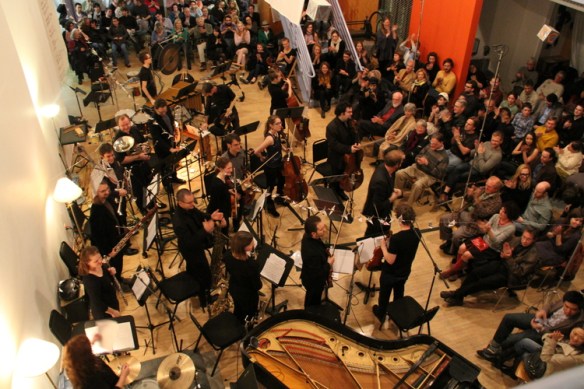 Most 23-year-old classical musicians are just beginning their careers: they’re fresh out of college, joining their first chamber groups or small-scale symphonies, maybe playing local concerts here and there, or preparing for grad school. But composer, vocalist, and percussionist Jodie Landau is not your typical 23-year-old.
Most 23-year-old classical musicians are just beginning their careers: they’re fresh out of college, joining their first chamber groups or small-scale symphonies, maybe playing local concerts here and there, or preparing for grad school. But composer, vocalist, and percussionist Jodie Landau is not your typical 23-year-old.
 He works with the acclaimed Los Angeles-based modern music collective, wild Up, as a performer, composer, and production manager. He’s toured and performed around the world, has collaborated with renowned classical and jazz groups alike, and recently even traveled to Iceland to collaborate on a concert and recording with Graduale Nobili (you know, the Icelandic choir that recorded and toured with Bjork for three years). As a solo performer, he sings while playing vibraphone and marimba.
He works with the acclaimed Los Angeles-based modern music collective, wild Up, as a performer, composer, and production manager. He’s toured and performed around the world, has collaborated with renowned classical and jazz groups alike, and recently even traveled to Iceland to collaborate on a concert and recording with Graduale Nobili (you know, the Icelandic choir that recorded and toured with Bjork for three years). As a solo performer, he sings while playing vibraphone and marimba.
Just consider that for a moment. How many vibraphonists or marimba players do you know? Probably not very many. And of them, how many sing while playing, compose their own music, collaborate with multimedia artists, and tour the world? Probably even fewer.
Did I mention Landau also recently released a new album with wild Up?
It’s called “you of all things,” and it features six vocal works by Landau, as well as works by Ellen Reid, Marc Lowenstein, and Andrew Tholl. In addition to composing over half of the works on the album, Landau also sings and plays vibraphone, crotales, bass drum, and piano on the recordings.
Of course, having an adventurous chamber orchestra to collaborate with certainly doesn’t hurt. Led by artistic director and conductor Christopher Rountree, wild Up is committed to creating visceral and thought-provoking musical happenings, transforming the concert space into a place without borders—a place filled with endless possibilities to connect and create with one another.
In short, it’s the perfect group to perform Landau’s music, which merges elements of classical chamber music, rock, and jazz with multidisciplinary art forms such as live performance, film, theatre, and dance. The album features performances by Landau with wild Up and background vocals by Graduale Nobili.
And it all begins with “an invitation.” A short and sweet introduction to the album, Landau’s vocals swell with sincerity above clarinet motives and Graduale Nobili’s softly shimmering vocal harmonies.
But their voices take on quite a different role in the piece that follows: Ellen Reid’s “Orlando & Tiresias.” The piece is a striking and surreal duet between Landau and the chorus, with dynamic and textural contrasts so dramatic that the piece is at times almost reminiscent of a rock opera.
Landau’s “the taste of the room” sounds like something of a dissonant watercolor painting: strings, woodwinds, and wordless vocals blend together and sway apart to create a mesmerizing sonic landscape.
Speaking of painting, Landau incorporates a stroke or two of tone-painting in the beginning of his sweet and sincere “a ballad – for you dear.” Delicate harp ornamentation compliments his delicate lyrics as he sings of love, where “we dream and wake in heaven.” But the sweetness is short-lived, and the song transforms entirely as he encounters (and then overcomes) the greatest tragedy: heartbreak.
Marc Lowenstein’s two-part “This” is the most rhythmically adventurous piece on the album, though Landau remains in calm control of his vocals above the unrelenting, ominously dark, and at times even chaotic bed of instrumental textures.
The work is followed by a similarly ethereal piece by Andrew Tholl: “Memory Draws the Map We Follow.” A ghostly choir of vocal melodies floats above airy strings and a grim, growling bassline, drawing a meandering map of otherworldly haunts.
The album comes to a close with three more compositions by Landau. The first, “as I wait for the lion,” is a simple, swelling, and poignant piece that pulls on the listener’s heart strings with each and every pluck of the sparkling harp, each and every knock of the delicately twinkling percussion behind Landau’s heartfelt voice.
Landau’s vocals takes on more of a pop music aesthetic in “stay going nowhere,” a piece which combines the unrelenting energy of a rock song with the intricate orchestration of a chamber work.
But he saves the best for last: the most charming piece on the album is “as we sway,” a lovely and lyrical ballad with Landau’s warm, gentle voice humming above a delicate pizzicato backdrop. By the end of the album, it’s clear that this is a young man who is feels his emotions deeply and viscerally—and who is ready to explore them through the full spectrum of musical expression.
Not bad for a 23-year-old.

